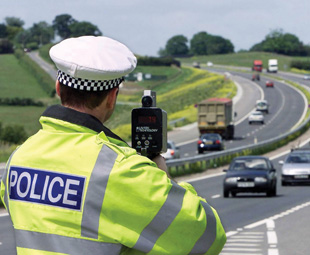Drop the cops, raise the glass?

The lack of road safety and the ineffectiveness of police officials in terms of enforcement are issues South Africans know well. It’s a fight, and we’re not alone.
I think it’s impossible to find a country where citizens are happy with their officials. In South Africa successive leaders are not much better than their predecessors; legislation worth being called such is often not put in place, corruption and bribery happen in clear sight, training and qualifications are minimal, manpower is overstressed and doing one’s job seems to be a chore. Call a spade a spade – it’s a situation crying out for change, but we have a long way to go.
The United Kingdom (UK) also seems to have a long way to go, having experienced a cut in traffic police numbers of 12 percent in the last five years. Some forces have suffered reductions of up to 40 percent. These statistics are causing outrage, according to recent press releases by the UK’s road safety charities Brake UK and the Institute of Advanced Motorists (IAM).
“Cutting traffic police is a false economy,” warns Julie Townsend, deputy chief executive at Brake. “The crashes and casualties they help prevent inflict devastation and are a huge drain on public services,”
The cuts come in the midst of the UK government’s introduction of a new offence against driving under the influence of illegal drugs, including setting limits for the presence of drugs in the bloodstream and provision for police to use roadside drug screening devices. “These cuts undermine important progress being made by government to tackle driving while high – as much as we need the new law, we also need the officers to enforce it,” adds Townsend.
Research conducted by Brake reveals that 31 percent of UK drivers think there is a less than one-in-ten chance of being caught drinking and driving – despite several highly publicised reports of young people being killed by drivers who are drunk or high over the last few years.
Of course, the problem is not unique. Arrive Alive indicates that drunk driving is one of the biggest threats to road safety in South Africa, stating that half of the people who die on the roads have a blood alcohol concentration above the legal limit of 0,05 g per 100 ml (for regular drivers, professional drivers 0,02 g per 100 ml).
It is stated that six out of 10 drivers who die in accidents have “dangerously high” alcohol levels in their blood while it is estimated that 50 percent of truck drivers and 30 percent of taxi drivers on the road had been drinking or smoking marijuana. According to the South African Police Service, incidents involving driving under the influence of alcohol or drugs increased from 66 697 cases in 2011 to 69 441 cases in 2012.
The IAM shares Brake’s concerns that road safety does not appear to be a high priority for the UK’s new police commissioners, despite high public concern and senior police officers expressing their frustration at the lack of priority given to policing of roads by successive UK governments. It’s a sad state of affairs when there are capable police officials who want to work and members of the public who want them to work, but higher authorities who, for their own reasons, see otherwise.
Sure, South Africans fight the same fight, but the World Health Organisation’s 2013 Global Status Report on Road Safety puts into perspective how much effort is really needed. In the UK there are 3,7 road deaths per 100 000. The South African figure is 31,9 deaths per 100 000.
We can only dream of 3,7 deaths per 100 000. If this was our figure we’d call it a job well done. Yet, in the UK, it’s just not good enough …
Published by
Focus on Transport
focusmagsa




